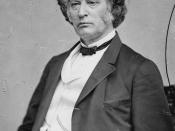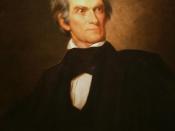Alex Koukharevitch Ms. Glass
H5X 1/7/09
Homework #23
The North and the South always had their variations. The political, social and economic systems of both sides differed greatly, thus making it essentially impossible to change the systems without conflict. The South relied heavily on agriculture and slave population for economic stimulation while the North relied on industrialization. Despite the moral question of slavery, the economic issues between the North and South severely strained relationships in the post period of the civil war outbreak.
Andrew Jackson passed the tariff of 1828; the tariffs eventual goal was to protect the industry of the United States from having to compete with European goods by increasing the prices of European products since the imported product were way cheaper than those in the US. This prompted the federal government to tax imported goods, thus promoting the Americans to manufacture their own products since it became more lucrative to do so as opposed to buying them abroad.
Southern states greatly opposed the governments decision of the tariff. The most opposition came from South Carolina. The "South Carolina Protest Against the tariff of 1828" expresses South Carolina's immediate disapproval of the tax due to the fact that most of the goods could not be manufactured in the state because of a lack of factories. As a result, South Carolina was forced to pay the high tariffs. The south came to believe that the tariff only benefitted the North and harmed the South; therefore, the tariff created tension and disdain toward the northern states among the southern states.
At the time, John C. Calhoun, the vice president and a North Carolina politician, was a staunch protestor of the Tariff of 1828. In "Mr. Calhoun's Sentiments" he sated that the tariff was "unconstitutional" and the government, through the...


